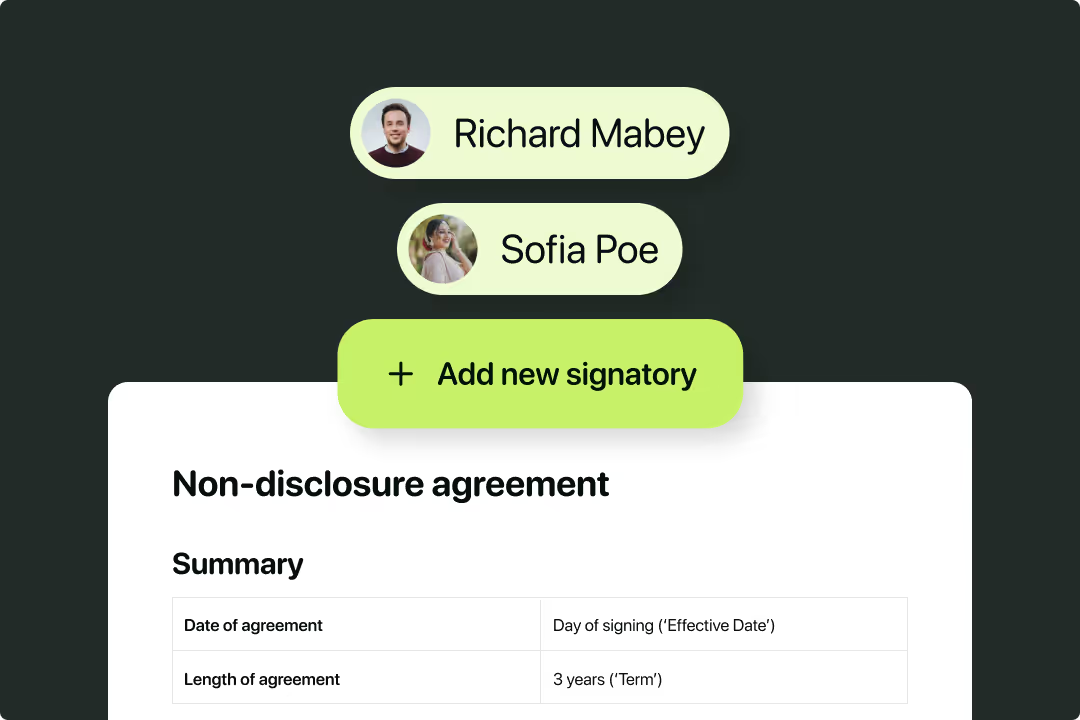Solutions
Customer Support
Resources
Managing contractual obligations can be a nightmare for businesses with lots of contracts and no single source of truth.
But fulfilling your contractual obligations is critical to your company’s growth, so the sooner you can get a grasp on your obligations, the better.
This guide explores how obligation management software can help you regain control of your contractual obligations and ensure compliance in 2026.
Poorly managed contractual obligations can prove costly for businesses. In fact, the WCC estimate that ineffective contract management practices cost businesses an average of 9% of their revenue each year.
This isn’t surprising when you consider the impact of missed contractual obligations. Parties that fail to fulfill their obligations will have breached their contract, meaning they could have their contract terminated, face late delivery fees, or even be forced to pay out for costly litigation.
Missing contract deadlines can also cause your commercial relationships to break down because companies want to work with reliable and trustworthy suppliers that can deliver on their promises.

If you don’t live up to their expectations and manage your obligations effectively, they could decide to end the relationship early. Even if a customer doesn’t terminate their contract following a breach, it’s unlikely that they’ll want to renew it.
Prioritizing how you manage contractual obligations gives you the opportunity to mitigate this risk, capture more revenue, and maintain customer relationships.
Effective contract obligation management is difficult because there’s often a lack of visibility into contracts and the obligations within them.
This manifests itself in different ways, but it often results in teams being unable to identify what their individual obligations are and when they’re due. Let’s explore these challenges in more detail now.
The most obvious challenge businesses face is that it’s difficult to keep sight of contractual obligations when there’s no visibility into them.
Businesses can manage hundreds, sometimes thousands of contracts at any one time. Yet, the Journal of Contract Management estimates that 71% of businesses can’t locate 10% of their contracts, meaning all of this obligation data could be lost forever.
Even if they do know where their contracts are, identifying the contractual obligations and important dates within all of these contracts involves a lot of manual work.
Lean legal teams have to read through each contract individually and capture the important contract metadata in a contract management spreadsheet of some sort. If they don’t they’ll have to regularly review individual contracts and track these obligations manually.
It’s not always clear who is responsible for which contractual obligations in a business. When contracts are created as static files in Word editors and shared with stakeholders via email, it’s easy for the contracts to get lost and for the parties to assume that someone else will manage upcoming deadlines.
Obligation management software solves this problem by allowing users to set automated contract reminders and choose recipients for these. Without this clarity, it’s easy to see how important contractual obligations get overlooked, or critical deadlines are missed.
It’s rare that the contract creator is the individual responsible for performing the contract in full. Often, contractual obligations depend on action from other departments in the business.
Yet, it’s uncommon for legal and commercial teams to collaborate effectively on contract management. Legal tends to work on contracts in silos, making it difficult for business teams to understand the role they need to play, what is expected of them, and when.
Fortunately, there’s an opportunity for businesses to improve their obligation management processes by implementing obligation management software. Let’s explore this solution in more detail now.

Obligation management software is technology that helps teams to identify, track, and be reminded of their contractual obligations.
It does this by bringing all of the important contract data into one workspace, making it easy to find, view and monitor obligations and responsibilities at scale.
By centralizing this information, the software can reduce the time organizations spend manually tracking obligations and free up this time for higher-value work instead. It can also make contract compliance and contract performance much easier.
Contractual obligations have due dates that need to be captured and tracked to ensure compliance.
Automated contract templates can streamline the process used to capture and track these dates by pulling them directly from contract smartfields into an intuitive contract dashboard. This dashboard can then be used to filter, query, and track contracts based on metadata within them, providing real-time visibility into contracts and their deadlines.
Automating this data entry and capture process will help to improve compliance and reduce the time your teams spend on manual contract admin tasks.
{{quote1}}
A centralized contract repository is essential for effective obligation management because it provides businesses with the real-time visibility they need to track contracts and obligations.
More specifically, a contract repository provides legal and business teams with easy access to their portfolio of contracts, rather than having to search high and low for contracts across different local and shared drives.
This means that they have full visibility into contracts, obligations, and due dates. Without this visibility, it’s easy for businesses to forget about their individual responsibilities or miss important contract dates like commencement dates or contract renewal deadlines.
{{quote2}}
Automated contract reminders ensure all parties are aware of upcoming deadlines and obligations without needing to constantly review contracts post-signature. Instead, teams can rest assured that they’ll be notified when their action is required, allowing them to focus on higher-value tasks.
This helps to ensure compliance with contractual terms, avoid a breach of contract, and prevent costly legal disputes that occur when important contract deadlines are missed.
Juro’s automated contract reminders are fully customizable and correspond to the date smartfields within your contracts. This gives you full control over upcoming contract deadlines and enables you to spend less time tracking contracts manually and more time on other projects.
{{quote3}}
Juro’s all-in-one contract platform is data-rich and flexible, allowing teams to track, manage and set reminders for contractual obligations at scale. To find out more, fill in the form below to book a personalized demo.

Lorem ipsum dolor sit amet, consectetur adipiscing elit. Suspendisse varius enim in eros elementum tristique. Duis cursus, mi quis viverra ornare, eros dolor interdum nulla, ut commodo diam libero vitae erat. Aenean faucibus nibh et justo cursus id rutrum lorem imperdiet. Nunc ut sem vitae risus tristique posuere.

